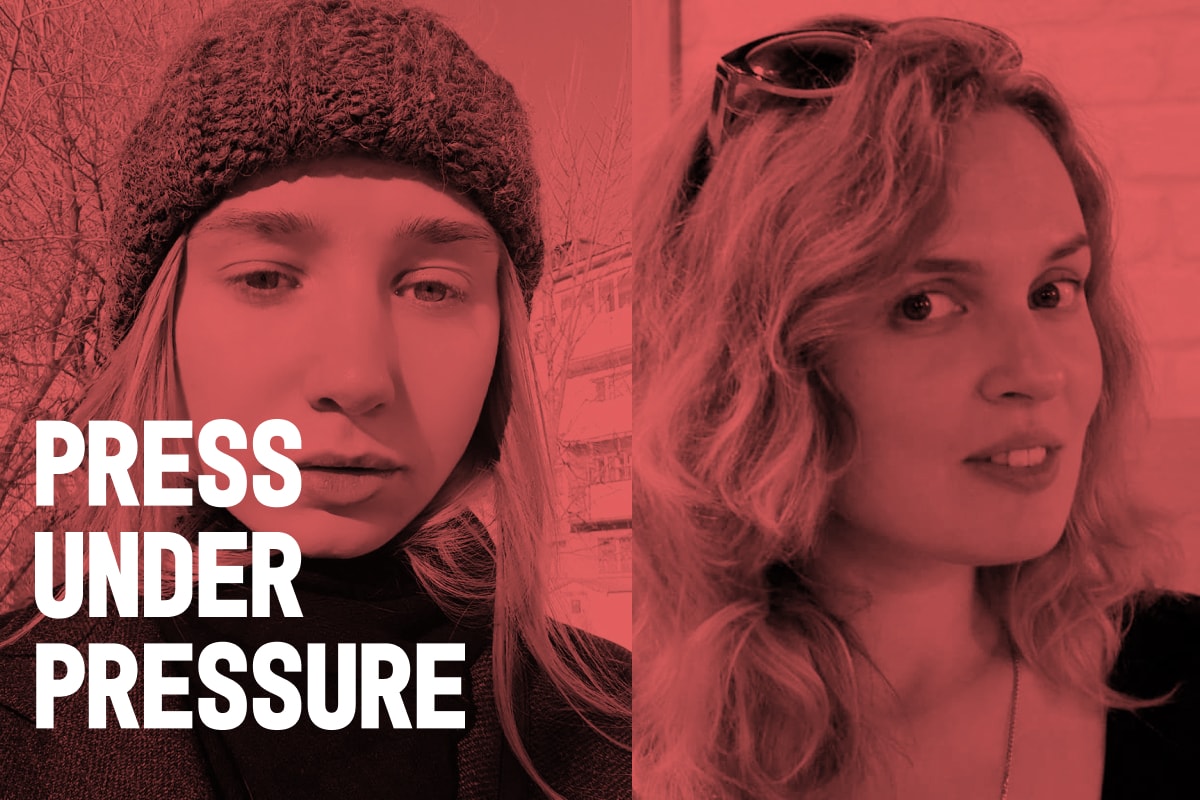
The story of Katerina Andreeva and Daria Chultsova, Belsat journalists, as told by their colleague Dmitry Yegorov.
The court found the journalists guilty and sentenced them to two years of imprisonment in a low security prison.
Before the trial, the journalists were kept at a pre-trial detention centre. They were denied to meet their families. Human rights defenders recognized the journalists as political prisoners.
On February 18, 2021 the final court proceedings took place (the total duration of the proceedings was three days: 9, 16 and 17 February) where the court judgement was to find the Belsat reporters guilty and sentence them to two years of imprisonment in a low security prison.
In November 2020, when the girls had already been detained, we spoke to their colleague and editor Dmitry Egorov about how Katerina and Daria worked, and what Belsat TV channel was doing under the given circumstances.
– When Katya and Dasha were given seven days, it became clear that something was wrong. We expected that there would be either a fine or the full 15 days. But here was such a strange decision – seven days. Later it became known that Katya and Dasha were to be defendants in a criminal case. On the one hand I believe this is revenge. Revenge for the streams and for the previous work of Katya and Dasha. On the other hand, it is part of the policy of intimidating journalists. Not only Belsat, but all journalists in principle – any who are ready to provide independent information in Belarus.
– For the state, not all journalists are ‘media’ journalists because they aren’t registered by the Ministry of Information.
– However, this does not prevent them from fining us for several years in a row for the production of media materials, whether we are classed as journalists or not. So are we journalists or not journalists? Please, make a choice.
Yes, it is true. Belsat has been working illegally in Belarus since the first day of its existence. This is understood by our colleagues and everyone who works for us. And this means there are certain risks. Everyone knows that too. But the criminal case is very serious overkill, in my opinion. We still cope with all the fines, and even in a sense, we are used to it. This is a kind of tax on independent information. That is how we perceive it. We are accustomed to the fact that we, the “Belsatovtsy”, have been regularly detained for several years.
But we cannot get used to such things as criminal punishment, or arrests for 15 days, for 30 days, when these «days» are rounded up … This is a very dangerous situation.
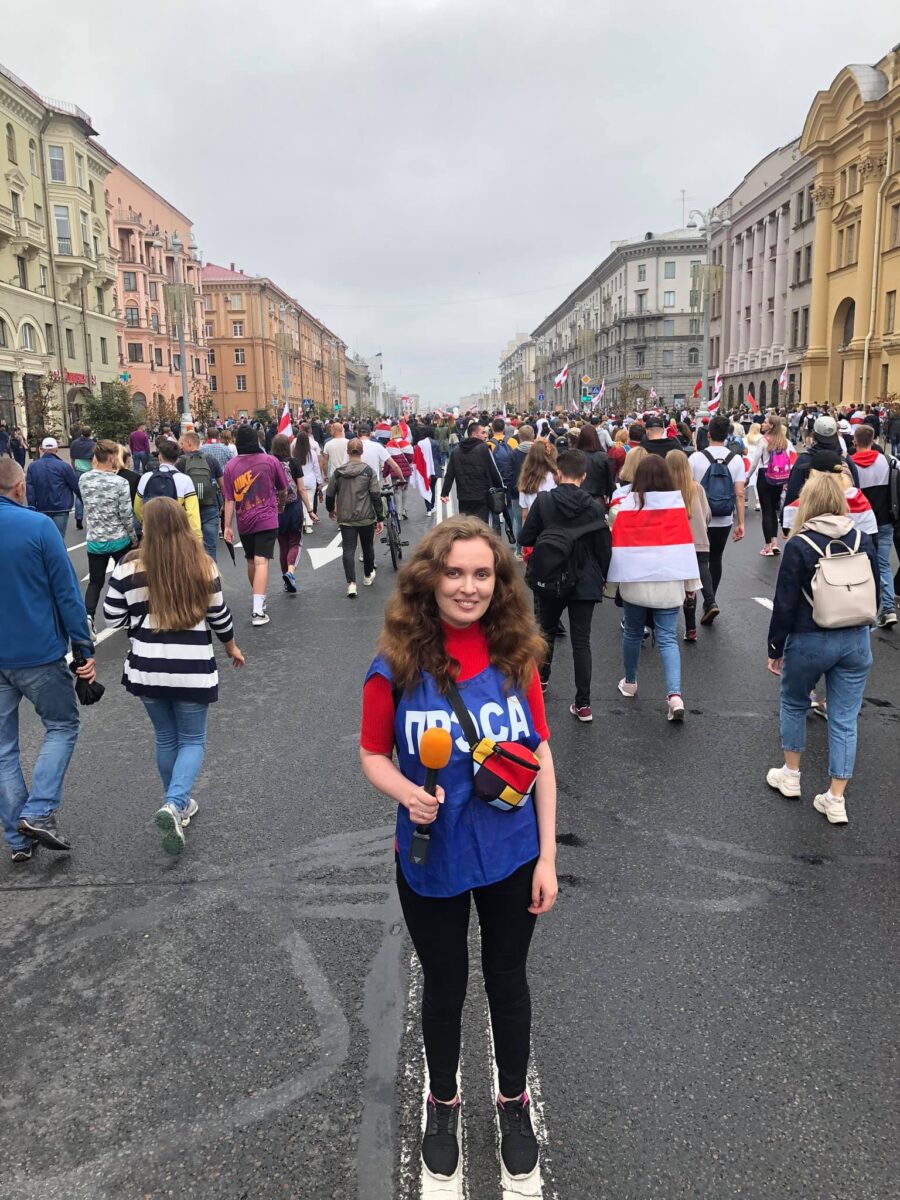
Katerina Andreeva. Photo provided by Belsat TV
– Was there any fear that everything could end in a criminal case against Katerina and Daria?
– Before this, our other colleagues from Belsat were also drawn into criminal cases. These include Dima Soltan, Dima Kravchuk, Artyom Boguslavsky. But, fortunately, their custodial measures were not so severe. They were not placed in the isolation unit. They just served a “day” and got off with a fine. Did we expect that there will be continued? In principle, no one excluded the possibility that there would be new persons involved in criminal cases among journalists. But we hoped to the end that there would be no such measures of detention as the isolation unit and prison.
– During and after the 2020 election campaign, Katerina Andreeva was detained more than once in the performance of her professional duties and faced administrative charges. Was the journalist hunted especially?
– The hunt was on for everyone who cnoducts live streams. Streams became a pain for the authorities, they wanted to prevent them in every possible way. Our film crews were tracked down when signatures were being collected, at pre-election meetings and when rallies were held. There was such a story in Grodno: the police tracked us down and said that if there was even one more second of stream, they would detain us and confiscate our equipment.
The hunt was on for everyone who conducts live streams. Streams became a pain for the authorities, they wanted to prevent them in every possible way.
Even before the elections, there was a targeted disconnection of mobile communications. For example, when we were planning to stream from an election meeting, all of a sudden, mobile devices stopped working for our camera operators and journalists. And the internet, and in general any connection.
Was there a hunt specifically for Katerina or specifically for Daria? I believe that there has been and continues to be a hunt for those who actively broadcast, stream, and take videos. I know that the secret services may still have a special attitude towards Katerina, primarily because Katerina with Igor Ilyash (husband of Katerina Andreeva. – Ed.), are the authors of numerous investigations. For example, about how Belarus trades with the unrecognized LPR and DPR [separatist regions of Ukraine supported by Russia], how it cooperates with the Crimean authorities [Russian-backed government of the annexed Ukrainian territory]. They also conducted a journalistic investigation into militants of Belarusian origin who are fighting or have fought in the Donbass [Ukraine], who later returned to Belarus, and whom the secret services do nothing about.
I think that this is another additional point, because of which Katerina Andreeva and Igor Ilyash are of interest to the secret services. I do not exclude that Igor, who is now on the “day”, he was given 15 days, may also be charged with any criminal liability or that some kind of interrogation will begin. We have absolutely no idea what will happen next.
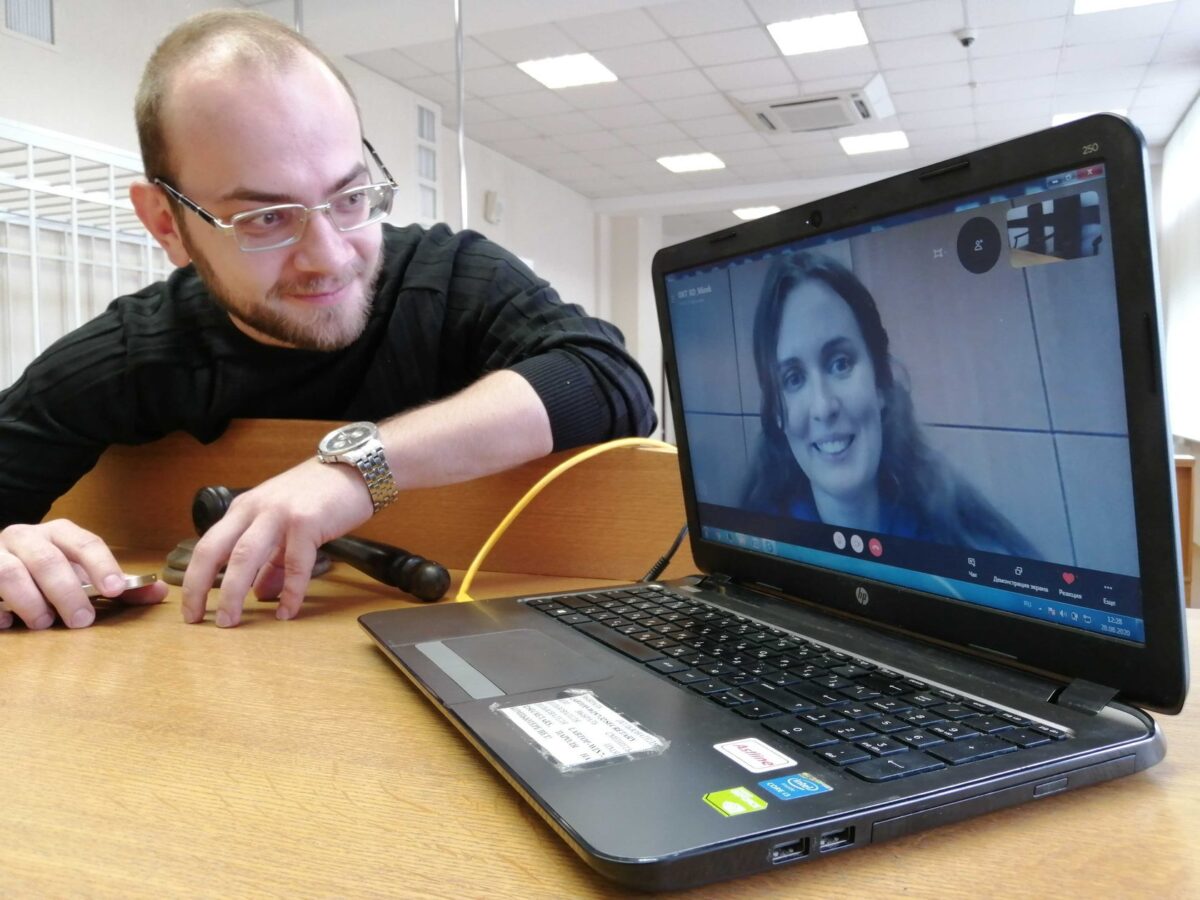
Igor Ilyash at the trial of Katerina Andreeva. Photo provided by Belsat TV
Katerina has always been interested in hardcore topics: militants in the Donbas, corruption. Katerina developed these topics together with Igor. Besides, Katerina is a very charismatic, cool streaming journalist. She likes the drive of live streams, she likes to do them. During such work, she gives her best by 120%. And you can see results in what she does.
It was streams that became her main job during the elections and after. This is what she has been doing the most in recent months. We hoped that Katerina would return to special investigations. Because there are very few journalists who undertake such investigative work. But for now the priority for her was just streams, live broadcasts.
In addition to pressure from the authorities, it is known that Katerina was threatened on social networks. For example, on her and Igor’s investigation about the militants in the Donbass. Because it came from there. We had a serious conversation with Katerina about the threats. She said: “I see that they just want to unsettle me. They specifically threaten me, they want to scare me, but they won’t succeed”. She tried not to take it to heart, although the threats were actually scary – considering what were written by people who, perhaps, really have combat experience in the Donbas and who did not like what Katerina wrote about them.
Detentions, fines, courts, summons, some calls from the police that you need to appear by a subpoena, they said that they want to talk … All of this saps a lot of energy. In addition, you constantly understand that your personal phone may be seized from you, that equipment may be seized from you or your camera operator, which also costs money. You can be detained and thrown behind bars. You feel responsible for everything, that your colleague is left virtually without a tool for work, for earning a living.
You constantly understand that your personal phone may be seized from you, that equipment may be seized from you or your camera operator, which also costs money. You can be detained and thrown behind bars.
This is also a very significant blow to journalists. And you always keep in mind that it’s best not to get caught. Yes, maybe they will release you, check your documents, issue a summons and give you a fine, but there is always a risk that one will be left without equipment and virtually without work. It also means that the capabilities of our TV channel will decrease: we will not be able to shoot some stories, make reports or streams.
– What materials did Daria Chultsova do? Was she in this situation for the first time?
– She had the status of a suspect in a criminal case for the first time. But not for the first time had she been involved with the police: she had been detained as a journalist, as a camera operator. Dasha is both a journalist and an operator, which is her unique value. The fact is that she previously worked in the city of Mogilev as a journalist with a partner camera operator. In September, she decided to move to Minsk and wrote to me about it: that there was more work in Minsk, more interesting, and she would like to try herself as a camera operator. It turned out that in Mogilev she not only went to shoots with the cameraman, but constantly asked him how the equipment worked, tried to shoot things herself. And already in Minsk – after the move – she began to work both as a journalist and as an operator.
Dasha, I am sure, has a great future as a TV journalist. When a person understands how to do a story, and film reports, then he is immediately half a head taller than his colleagues, who are only journalists and are not familiar with the camera business.
Dasha works with socio-political topics, talks about people’s problems. Well, she also started to go on streams as an operator in Minsk. On that day – November 15 – she worked with Katerina as her camerawoman.
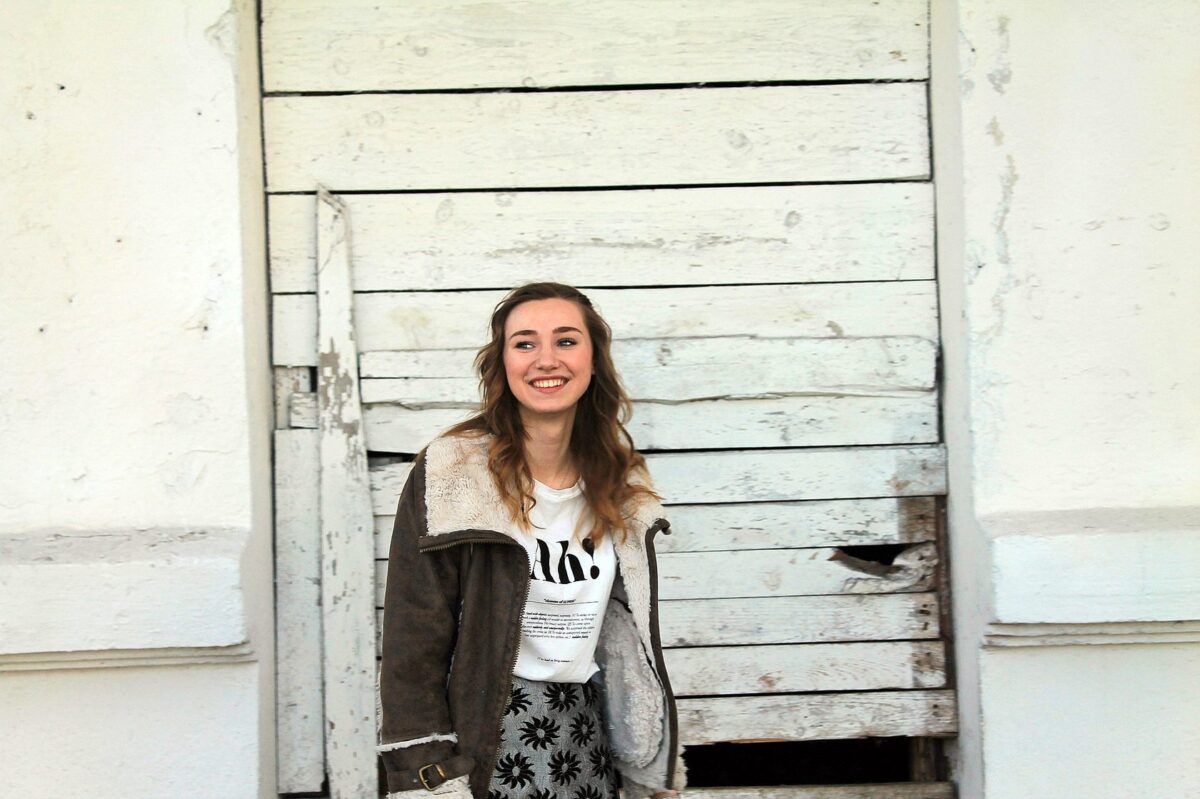
Daria Chultsova. Photo provided by Belsat TV
As far as I remember, Dasha had not been detained in Mogilev. Perhaps were she received subpoenas by our “favorite” article 22.9 of the Code of Administrative Offences. There were fines. But the detentions began in Minsk. Because of the nature of my work, I remember very well the days when we first searched for the right police department, and then – when we found her – how I contacted Dasha’s mother.
It’s always hard to call a mother and say: “Hello, my name is Dima Yegorov, I’m from Belsat, your daughter has just been detained. Don’t worry, we know where she is, we will provide her with a lawyer…”. And this is especially difficult in the case of Dasha, because she is a young journalist, at the very, start of her career. I understand how psychologically difficult it is for the journalist themselves and their relatives who do not know what is happening to the person. Because we bring to mind the context of all these arrests, how people are beaten, how they were beaten in the first days after the elections. You never know what will be done with journalists.
What is happening to Dasha now, we do not know, because the lawyer is not allowed to see her, and there is practically no contact. They sent her a package recently. I hope that everything will work out, that it will be easier for her there. It is very important that they all get letters, so that they do not feel completely isolated, that they have been forgotten.
What is happening to Dasha now, we do not know, because the lawyer is not allowed to see her, and there is practically no contact.
– What is Belsat doing to protect its journalists?
– First of all, we provide legal assistance. We help with lawyers for absolutely all of our journalists who get into trouble. We are in constant contact with relatives – both Katerina and Daria’s, and Igor’s, who is in the isolation unit.
But it is not so easy to do something here, to somehow influence the Belarusian authorities. I have a feeling that they are completely self-isolated and in some kind of vacuum. I’m not even sure if there are any opportunities for diplomatic interaction, for example, between Poland and Belarus, because Belsat is officially a Polish TV channel. I’m not sure that any contacts have been retained at all, because the rhetoric is such that Poland and Lithuania are the main enemies of Belarus. It’s hard to do something at the political level.
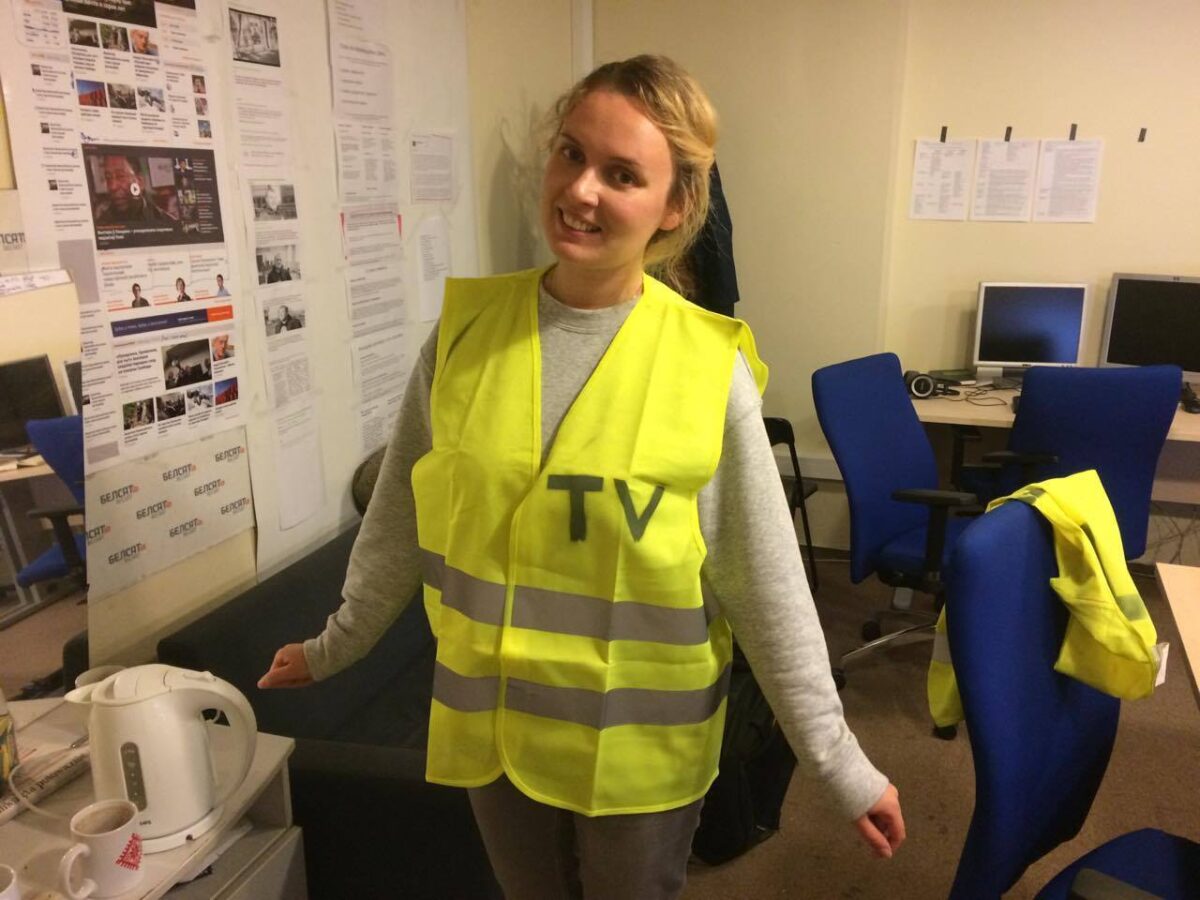
Katerina Andreeva. Photo provided by Belsat TV
We can talk and talk about it wherever it is possible, to say that our journalists are in trouble. Our colleagues from other media help us. We talk about how we work and how Belarusian journalism ended up in such a dire situation.
In spite of everything, journalists go out and continue to work, shoot stories. I admire the firmness and courage of my colleagues. I see that the potential is very great. For many, this persecution has further reinforced the belief that journalism and the spread of truth and independent information are not to be abandoned today. You can’t sink to the bottom, because then it will erase everything, wipe out the previous years of work.
For many, this persecution has further reinforced the belief that journalism and the spread of truth and independent information are not to be abandoned today. You can’t sink to the bottom, because then it will erase everything, wipe out the previous years of work.
In my opinion, only now it has become absolutely clear to all colleagues that the arrests of journalists – for example, Belsat or TUT.BY – is not a problem just for Belsat or TUT.BY. It is a problem for all of us. Because it can happen to anyone. “Belsat” was again denied accreditation, but the next day a campaign to “normalize the situation” with accreditations began – and accreditation was taken away from everyone.
It is very important for us to respond to the slightest incidents of harassment of journalists. It can’t be ignored. Today – Belsat, tomorrow – a different media. This is an attack on all journalists. If we retreat further, the authorities will continue to advance. I am not happy that this whole situation happened, but I am glad that this pressure on the media caused the response that we have become even more in solidarity.
Terms and conditions
Partial or full reprint is permitted subject to following terms of use.
An active direct hyperlink to the original publication is required. The link must be placed in the header of the reprinted material, in the lead or the first paragraph.
Reprints, whether in full or in part, must not make changes to the text, titles, or copyrighted photographs.
When reprinting materials from this page, attribution must be given to the Press Club Belarus “Press under Pressure” project, collecting evidence of repression against independent media and journalists in Belarus.